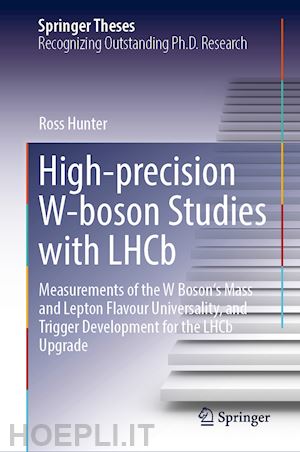
Questo prodotto usufruisce delle SPEDIZIONI GRATIS
selezionando l'opzione Corriere Veloce in fase di ordine.
Pagabile anche con Carta della cultura giovani e del merito, 18App Bonus Cultura e Carta del Docente
This book details a new and ground-breaking contribution to the search for a successor to the Standard Model (SM) of particle physics - the largest modern endeavour in the field. In the hope of seeing a discrepancy with the SM's predictions, this work discusses two hitherto unforeseen measurements at the frontier of experimental precision: a measurement of W-boson mass and a test of the fundamental axiom of the W boson's lepton flavour universality (LFU). Both measurements are made by analysing collision data from the LHCb experiment at the Large Hadron Collider (LHC) at CERN, and represent the establishment of a new field of high-precision Standard Model tests with LHCb. This book also describes the development of new software tools for the optimisation of the LHCb trigger system, which helps to ensure that LHCb's exciting physics program can continue to prosper into the future. This book is accessible to those with graduate—or master's—level training in experimental particle physics.
Introduction.- Theoretical Background.- The Large Hadron Collider Beauty Experiment.- Development of tools and selections for the Run 3 LHCb trigger.- Precise modelling of W-boson physics.- Detector modelling strategies for precision EW studies.- Studies of high-pT muon reconstruction efficiencies.- Measurement of the W boson mass.- Test of lepton flavour universality in W-boson decays.- Conclusion.
Ross Hunter was 16 when the Higgs boson was discovered in 2012 at the Large Hadron Collider (LHC) at CERN, Switzerland. This momentous event inspired him to further study physics and to undertake an extra-curricular project reviewing the discoveries made over the years at particle colliders. At this point, he knew he wanted to become a researcher in physics. He completed a B.A. M. Sci. in Natural Sciences (specializing in physics) at Fitzwilliam College, University of Cambridge, but his future career was particularly shaped by his internships during the intervening summers. After his second year, he spent the summer in the particle physics department at the University of Sheffield prototyping detector technology for trying to find dark matter. The following summer he did similar work as part of an exchange programme between the University of Cambridge and the University of Göttingen.











Il sito utilizza cookie ed altri strumenti di tracciamento che raccolgono informazioni dal dispositivo dell’utente. Oltre ai cookie tecnici ed analitici aggregati, strettamente necessari per il funzionamento di questo sito web, previo consenso dell’utente possono essere installati cookie di profilazione e marketing e cookie dei social media. Cliccando su “Accetto tutti i cookie” saranno attivate tutte le categorie di cookie. Per accettare solo deterninate categorie di cookie, cliccare invece su “Impostazioni cookie”. Chiudendo il banner o continuando a navigare saranno installati solo cookie tecnici. Per maggiori dettagli, consultare la Cookie Policy.